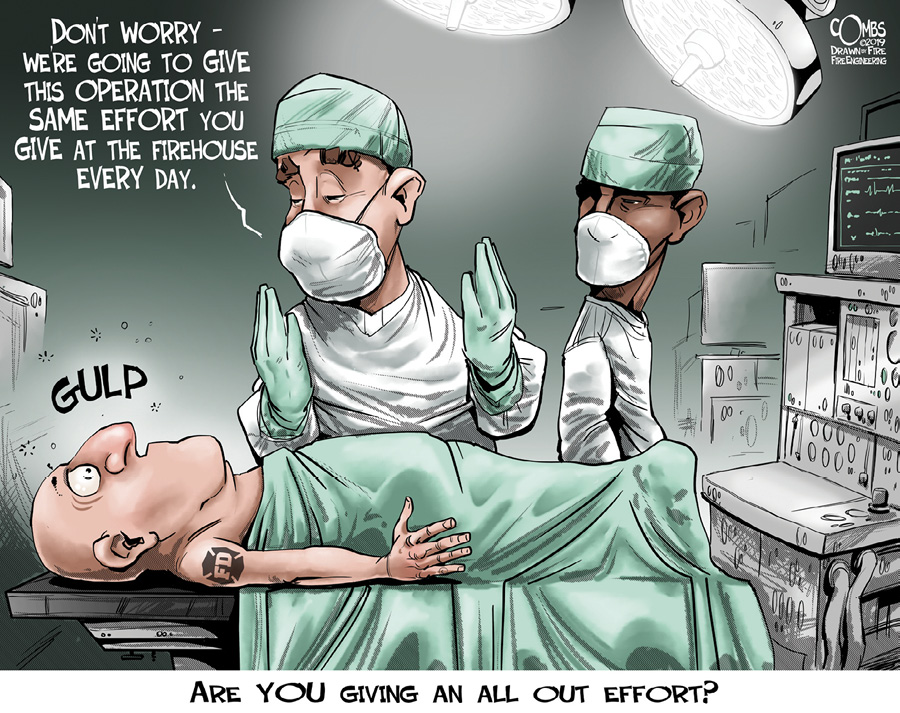
Friedrich Nietzsche’s (1911) “Last Man” is a deplorable being who seeks only comfort and safety. The “Last Man” will not stand up for what he believes in, nor will he question authority. The fire service cannot promote this type of leader or follower. Followership, the correlate mode of leadership, was popularized by Robert Kelley (1993) and has been adopted throughout the fire service. I believe that followership must be properly understood and critiqued so that the idea is not conflated with blind trust in leaders. Implementing a misunderstood version of followership could train firefighters to be “Last Men”—to the detriment of the fire service.
Followership is meant to describe the art of being a good member of a department: Leaders must lead well, and followers must follow well. According to most articles on followership, a good follower obeys commands, adopts new policies and procedures, and supports his leader. Analysis of what makes a good follower is vital to improving the efficiency and effectiveness of our most valuable (and expensive) assets: the firefighters. Therefore, departments must optimize the value of firefighters by leveraging their attributes. Obeying commands and adopting new policies and procedures do not optimize firefighters as departmental assets. Encouraging firefighters to speak up when they have a good idea, on the other hand, does optimize the value of each member of the fire service.
Followership and Courage
The fire service, department, and crew are composed of individual members. Each individual has unique perspectives and experiences that can enhance the larger organization. For this reason, followership needs to explicitly encourage members who wish to improve their department to voice their ideas, even if their ideas conflict with the ideas of department heads. Articulating one’s opinions should not jeopardize one’s career. That being said, firefighters willing to jeopardize their career for the betterment of the department should be honored, not scorned.
True leaders care about what is best for the whole department and its members, not just their career advancement. Career advancement and improving the department should be one and the same—in fact, one should be necessary for the other to occur; however, this is not always the case. Individuals and their motives dictate the unity of the two.
According to Kelley, “Effective followers hold true to their beliefs and maintain and uphold ethical standards, even in the face of dishonest or corrupt superiors (leaders). These individuals are loyal; honest; and, importantly, candid with their superiors.” This courage must not be left out of our understanding of followership.
The fire service is constantly evolving, and policies and procedures are evolving to meet new challenges, but what is new is not always best, and just because it is adopted does not mean it is not subject to analysis, skepticism, and critique. A member who respectfully speaks against deficiencies in the department’s policies or procedures should be hailed as a leader, so long as the disagreement is well thought out and based on more than opinion or sloth. The fire service is obliged to improve itself with new practices but also must always be willing to accept negative feedback and to retreat from new practices to old or alternative ones.
Negative feedback needs to be accompanied by positive proactive ideas. I am not recommending complaining. Complaining is easy: See a problem and complain. Solving a problem is art: See a problem, research possible solutions, test the solutions if possible, sell your idea to the chief, and stand by the success or failure of your idea. Maybe your idea will be adopted, and maybe it won’t be, but at least try. The bottom line is, if a member of a fire department identifies a problem, that member needs to feel empowered to recommend improvements and alternative ideas through the chain of command.
This type of followership, commonly called teamwork, strengthens fire companies, departments, and fire service. While responding to an emergency, any member of the crew may see the hydrant, fire department connection, victims, or potential hazards before the captain or engineer and needs to speak up. However, the command structure cannot be questioned, especially on the fire scene. Feeding the captain information is good, but trying to control the captain is foolish. Although a firefighter might see something the captain does not, it is more likely that the captain is seeing the larger picture.
A fire station that operates like a team builds buy-in among the firefighters and promotes the sharing of knowledge and experiential expertise. One member may be a hazmat guru, another may be an experienced medic, and another may excel at writing grammatically correct reports; a leader employs everyone’s talents to improve the team. Crew members enjoy the freedom to express their views on policies and procedures and should be encouraged to do so. Questioning a policy is the best way to understand it better.
Deconstructionism is the strategy of poking holes in an idea to see if it holds water, and every firefighter will naturally attempt to deconstruct each new policy the department publishes. Why not use deconstructionism to improve department policies? Encourage feedback from the ranks by listening to opinions and adapting policies to incorporate good ideas. Let’s build winning teams, not “last men.”
Sources Cited
For more news visit: www.fireengineering.com


